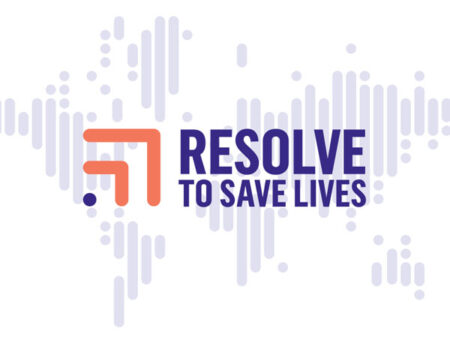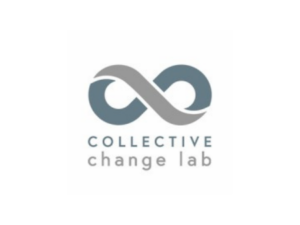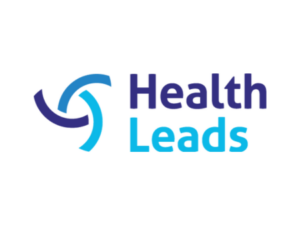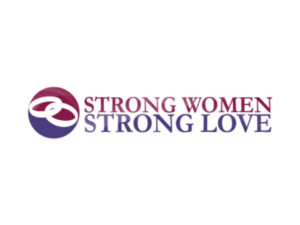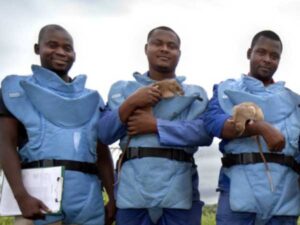Resolve to Save Lives aims to save 100 million lives by connecting governments, communities, and partner organizations to prevent and reduce infectious disease and cardiovascular disease.
Amanda McClelland of Resolve to Save Lives spoke with Lissa Harris on February 17, 2023. Click here to read the full conversation with insights highlighted.
Lissa Harris: Could you start off by introducing yourself and your project, and a little bit about the problem that you’re aiming to solve?
Amanda McClelland: My name’s Amanda McClelland. I’m the Senior Vice President of the Prevent Epidemics team at Resolve to Save Lives. The problem that we’re trying to address is blatantly obvious to everyone, but wasn’t when we started, which was that the world was not prepared for the next pandemic. When we started five years ago, one of our key messages was, it’s not if but when the next pandemic will occur. Obviously that pandemic happened and everyone now has at least some awareness or understanding of the risk that infectious disease has and the impact that it can have, not just on individuals but whole communities. So our team works with governments and partners to try to build health systems that can find outbreaks quickly, and respond and control those outbreaks so that they don’t turn into pandemics like COVID-19.
Lissa Harris: And the organization was founded by a former CDC director?
Amanda McClelland: Our founder was Dr. Tom Frieden, who was the US CDC director for eight years under the Obama Administration, he was also the head of New York City Health Department under Mike Bloomberg and undertook a number of large initiatives there that are now known globally, like tobacco free areas. So he was one of the first health departments to ban smoking indoors and a number of other big initiatives, especially around soda tax and a few of those initiatives that we now take for granted.
Lissa Harris: But your work is global?
Amanda McClelland: Our work is global, so there’s two initiatives within Resolve to Save lives. The one I lead on, Prevent Epidemics, and a second one on cardiovascular disease addressing hypertension. And together, the idea is that we save 100 million lives. So much of the work focuses on countries with very large populations. For us, in the Prevent Epidemics team, that means mainly focusing on Africa where the infectious disease burden remains extremely high and health systems are the weakest. [It’s] where we get ongoing and difficult outbreaks, like Ebola and Marburg, which we’ve had both of in the last few months, but also outbreaks that we should be able to control very easily, like cholera. We have more than 30 countries in the world at the moment suffering from cholera outbreaks, and we have the tools to be able to prevent and control things like cholera. Most of our work focuses on those countries that are still vulnerable to those outbreaks.
Lissa Harris: Is your work direct service or are you mainly working with government agencies? Who are the direct beneficiaries of your work? And if you could talk a little bit about how they benefit from the work that you do.
Amanda McClelland: It’s a bit of a different model at Resolve, we’re both a donor and an implementer, and because of that, we try to work directly with governments because we are trying to build the systems that give us scale. We need to get to every corner of countries and the way to do that is to make sure that the government systems are fit for purpose, but that there’s also room for communities and the private sector to engage in those systems. We work with government ministries of health and national public health institutes to create the systems that make space for communities and other partners to engage in preparedness.
We also work at the global level with organizations like the World Bank, Global Funds, World Health Organization. And what we try to do is to take the lessons from our accompaniment with governments on the ground and build those into our discussions and policy work at the global level to make sure that [there is] normative guidance and the policies [in place], the technical term is global health architecture. The way that organizations at the global level work together to support countries for what we call international health regulations is fit for purpose. For example, we support countries to travel to Geneva to be involved in the negotiations of what the international law for epidemics and pandemics will be going forward. It’s called the International Health Regulations. We try to elevate those voices from the ground into the global context.
Lissa Harris: What makes your approach distinctive from that of other groups that are working in this space? What makes you different?
Amanda McClelland: This problem is too big for any one organization to solve. So our approach is to try to connect organizations. What we saw was a lot of duplication or overlap and different approaches from the World Bank and WHO, for example, or even at the country level between the Ministry of Health and the public health department. Our values are around connecting, simplifying, and then scaling. And I think that makes us unique from others. We try to really leverage what others are doing and make sure that they are coherent, simplify that complexity that is there by trying to get multiple stakeholders moving in one direction and then really use those approaches to try to get scale.
Lissa Harris: We’ve all seen through the past few years just how broad the reach of a pandemic, and certainly the reach of an organization trying to prevent pandemics, can be. Can you share a particular example that illustrates the impact of the work that you do?
Amanda McClelland: There’s a few that would be good to pull on, but maybe I can focus on one of our newer initiatives called 7-1-7. This initiative is really built on three or four years worth of work and is a good example of us trying to connect pieces and to simplify approaches. The 7-1-7 [initiative] is actually based on a well known tool that epidemiologists have used for a long time called the timeliness metrics. Timeliness metrics is just a simple way of evaluating our ability to detect diseases and to understand how long it takes us to find the disease, how long it takes us to get a lab sample, how long it takes us to report on that sample. There’s about 11 steps in that timeliness metric. So it’s quite complicated and really only used by epidemiologists when they were looking at surveillance systems.
One of the challenges we saw was the disconnect and the siloed approach. When we strengthened systems, we worked with communities and then a separate team often worked in surveillance and then a different group worked with laboratories and we were strengthening systems in silos. And when an epidemic or a pandemic happened, those pieces really needed to work together seamlessly, but we weren’t looking or assessing them in a systems way. We were looking at them in a siloed way. So we took those timeliness metrics and applied it to our ability to find outbreaks and respond to outbreaks quickly. And 7-1-7 is an organizational principle that helps focus donors and partners and countries onto those important parts of the health system that help us find outbreaks and respond quickly. The idea is that countries find outbreaks within seven days, they notify within one day, and they respond or start response within seven days.
This gives them a benchmark for performance so they understand where they are, but most importantly helps them analyze their performance and find the challenges or the bottlenecks that are delaying those components and really use those to prioritize things that they need to fix. For example, in Uganda, there was an Ebola outbreak that unfortunately was more than 140 cases and got away from the government very quickly at the beginning, and they used 7-1-7 to identify that they were too slow in finding that outbreak. It took 46 days, but they looked at why they didn’t find that outbreak and they started to fix the system to make sure that that doesn’t happen again.
They were able to notify that outbreak very quickly, but it did take them nine days to really start the response. So they’re looking at how they can make sure that that happens quicker next time. 7-1-7 is a good example of learning from multiple agencies, simplifying that in a way that’s useful for countries to really identify their challenges and fix them quickly, and use that for accountability and communication to make sure that communities and other stakeholders know where they are and what they’re doing.
Lissa Harris: You mentioned that the 7-1-7 initiative is kind of a recent project, a newer project. Is this a post COVID project? Did it come out of lessons learned from the pandemic?
Amanda McClelland: It came from a project that we run called Epidemics That Didn’t Happen, which is an exciting project that we did with Skoll Foundation to really highlight the fact that public health has success [too]. You only hear about public health when things go wrong, when there’s big outbreaks, but actually every day we’re finding outbreaks and stopping outbreaks, and we wanted to shine the light on countries that did good quality work and to show donors and partners that public health does stop outbreaks. 7-1-7 came from some of the lessons when outbreaks didn’t happen, it was because we were finding them quickly and stopping them quickly. It came from COVID in the respect that we saw a lot of new partners come into the space. We saw a lot of new donors interested in the space, and we saw a lot of innovation happening, what we call internally bright, shiny things, looking for that silver bullet that would help us stop the next pandemic from happening.
Our approach was to do the basics well, and to do the basics consistently. So the idea of 7-1-7 came from the potential chaos and busyness post-COVID, with everyone wanting to support and help. It was a way to focus some of that support into what we think are the core pieces of the system that need to be strengthened first, which is finding outbreaks quickly and responding quickly. In terms of lessons from COVID, yes, we need to harness and have a clear vision of where we should focus our efforts.
Pandemic preparedness is everything now from deforestation and stopping what we call zoonosis spillover events all the way up to genomic surveillance and machine learning using artificial intelligence to predict where the next outbreak will come from. And all of those things are really important, but in the middle of that is the people that are seeing patients every day identifying when a patient potentially has something that might be unusual or could cause an outbreak, telling someone about that, testing that disease and supporting that person with good clinical care. 7-1-7 is our attempt to help provide a clear vision for all those new partners coming into the space after COVID.
Lissa Harris: What insights or teachable lessons do you think could be taken from your work that others could use, whether in this exact field or in a different problem?
Amanda McClelland: I think there’s a couple of things. One, understanding that we’re trying to address, you call them thorny problems. We call them wicked problems, these complex problems. Understanding that you need to constantly review the impact, whether good or bad, and continue to adjust. Thinking that you can have linear progression and improvement is a big lesson for us, that as we work on these systems, we overcome problems that we didn’t think we were fixing but the work has addressed, but that they highlight different challenges and new challenges and being aware, looking at the system and how it’s performing and being flexible enough. We’re very lucky that the Skoll Foundation gives us that flexibility in the grant money that they provide us to be able to pivot. Not every donor does that. Often we get a plan for 12 months or two years and we have to follow that plan.
Having adaptable money that allows us to adjust to the challenges on the ground is really important. I think empowering the communities and the counterparts on the ground to identify their own challenges and their own solutions and helping build an environment to share between countries [is also important]. We just brought five of our countries together in Kenya for a week, and it was fantastic to see them in the room for five days sharing common challenges, really coming into that room thinking that all of their contexts were different and walking away understanding that actually they were all facing four or five big challenges together. The way they overcame them might be slightly different, but the challenges are similar and their lessons are similar. So making space for partners to share lessons and to collaborate because I think we have more in common than are different.
And then, not being afraid to fail. One of the things we did in Nairobi is we celebrate what we call a Fail Fest. Making sure that we’re learning just as much from what’s not working as what is working and using both of those lessons to really shape the work that we do. So celebrating and sharing the failures and not just the successes to help others learn.
Lissa Harris: How do you measure your success? What is the evidence that you rely on to see that you’re making progress?
Amanda McClelland: Progress is iterative, I think. So we use 7-1-7 as a key metric. Helping countries find outbreaks quicker and respond quicker is our ultimate measure of success. That’s the key indicator that we use. We also use a World Health Organization tool called the Joint External Evaluations. It’s a report that countries fill in that explains their capacity, and we work with countries to improve their scores consistently. So that’s a big metric.
Our biggest takeaway is that countries are able to be adaptive and that they appreciate our support and they appreciate collaborating with us. It’s hard to measure that type of support. We often think about ourselves in the background providing catalytic support moving forward. Our big takeaway is that our countries are continuing to move forward, find outbreaks consistently, and sharing both their success and their failures. I think Uganda is a great example. They are very bravely sharing the failures of their detection system in Ebola and have been very open about that. I think that’s because we’ve been working with them on the importance of sharing both success and challenges.
Lissa Harris: I love the idea of Fail Fest and really looking into what didn’t work, and I wonder if you could describe an example of something that you tried that didn’t work, that you learned something from that others might learn from also.
Amanda McClelland: We just did a whole showcase of sharing the lessons. We presented four or five fails from across the team, and I think the common theme there was stakeholder engagement, making sure that we have the right people around the table to be able to make progress. When we don’t have that, often the projects fail.
I think 7-1-7 is a good example of where we celebrate, at least share the failures. The whole point of 7-1-7 is we share when we don’t meet those targets and we share the bottlenecks. What went wrong. So I think it’s not our failure, but Uganda’s ability to identify that they missed the first few cases of Ebola, and that was because they hadn’t engaged the private sector. They’d done a lot of work on Ebola preparedness, but specifically had done it with the public sector and the first few cases entered through the private sector. They were very open about sharing that challenge very early and asked for support to address the private sector and engage them very early. This is a great example of building that psychological safety with teams to be able to highlight where they’ve got challenges, ask for help, and mobilize support to address those.
Lissa Harris: Do you think that’s something that might apply in other countries and other contexts also, that if patients are coming through a private healthcare system that’s not as hooked up with public health, that you might see similar failures to detect something emerging that might become more dangerous and more widespread?
Amanda McClelland: The biggest failure in detection is access. So epidemics and pandemics have found the cracks in our system, whether they’re our social system that we found in the US for cash-based workers who couldn’t take time off work and had to turn up to work whether they were sick or not. That showed the gaps in the social system here in the US and how COVID impacted that community as opposed to people like me who can work from home and can stay at home and still make money. The example in Uganda highlights how important access is and that access points are open to all communities. Whether that’s because of conflict, what we’re seeing in Syria and Turkey right now where we can’t get access to specific communities, whether that’s because of rural communities and lack of services, whether that’s the LGBT community in some places who don’t have access.
We saw in Monkeypox the outbreak spread very, very quickly because specific communities didn’t have the same level of access to care or good understanding of how disease is transmitted in their community. Detection is really that point that helps show us where certain parts of the community don’t have equal access to healthcare and good quality care. That’s where the epidemics will grow. In Uganda, it was the private sector, but there’s lots of examples in the last few outbreaks everywhere between cholera, monkeypox and beyond that show us that access is a critical component.
Lissa Harris: If we set aside the issue of funding, because funding is always an issue whenever you’re trying to solve a tough problem, can you talk a little bit about challenges that you’re facing that you haven’t been able to crack and are still in front of you? Whether that’s scalability or political opposition or like you said, access issues, certain communities having barriers to access in healthcare. What are the main challenges that you see that are kind of preventing you from fully realizing your vision here?
Amanda McClelland: I think there’s two major challenges at the moment that concern us. One is political will that epidemics have suffered from this cycle of panic and neglect. This isn’t the first time we’ve had a pandemic. It was very similar to the one we had in 1918. We learned very similar lessons. There’s been multiple pandemics since then, but there’s something about pandemics and epidemics that affect society in a way that we just want to forget very quickly that it happened. COVID is still killing 500 people a week in the US. And we want to think about it being over. There’s something about pandemics and public health threats that is a challenge to maintain political will and to really keep the community’s interest in making sure that we’re making those investments.
It’s not about a lack of money because we get it in waves. We have too much money at some point and not enough at another point. It’s the consistency and sustainability of that. [Maintaining] political will is the biggest challenge at the moment. The second biggest challenge is community cohesion and trust.
Public health relies on public level interventions that do the greatest good for the greatest number, and that relies on people looking out for one another and doing enough to protect one another, whether that’s washing your hands or having safe water, wearing your seatbelt, driving on your side of the road and not someone else’s or wearing a mask, staying at home if you’re unwell. The increase in disinformation, the targeted attacks against science and public health, and the breakdown in trust is going to be the biggest challenge that we have going forward to try to control outbreaks. If you’d asked me a year ago if we could ever get polio in the US, the answer would’ve been no. But we’ve seen polio outbreaks in New York. We’re seeing cholera outbreaks in London. These are unheard of. We solved these problems 50 years ago, and those challenges are going to become greater for us, I think, as we go forward.
Lissa Harris: Can you talk about how you’re working to advance systems level change in your field, whether that’s through partnerships or leveraging technology policy change?
Amanda McClelland: One of the unique things about the way we’re trying to tackle this is thinking about this not as a technical issue, but as a change management issue. We know what needs to be done. We talk about lessons learned from COVID, but these are lessons that we haven’t applied from other epidemics. And the reason is that we don’t have the right governance structure and systems to be able to apply those consistently.
Systems wide change is trying to break down the siloed way we think about healthcare and think about it as systems that start in communities and end in communities. Making sure that health systems are accessible, that they’re equitable, that they’re fit for purpose, and that they’re sensitive enough to be able to detect one case of an unusual event and respond in all of the busyness of the day-to-day health system. We need to be able to pick up that one needle in the haystack and identify it quickly as a risk and be able to respond to that.
The system level change for us, we provide technical expertise and we couple that with operational excellence, how do you move money? How do you plan programs? How do you build leadership and governance and then support that with political will, because without that we’re not able to implement any of those things. Our system level change is the combination of the technical, operational and political will and trying to think about that in a way that uses change management across the system.
Lissa Harris: What do you think is most needed from other actors, from partners, from the government entities and ministries of health that you’re working with, to advance this kind of system level change?
Amanda McClelland: No egos. There’s no room for egos and territory in this. That’s been one of the biggest lessons is that there’s no clear boundaries in health systems and health security. We need to be open to learning from communities. We need to be open to learning from other disciplines, and we need to make sure that we’re connecting and making progress together. I think one of our biggest lessons is less ego and less territory and more collaboration.
Lissa Harris: How do you see your work evolving over the next five years?
Amanda McClelland: It’ll be interesting to see how the work evolves. Pre-COVID, we were one of just a few partners working in this space, trying to shine light on the need for more dedicated focus for epidemic and pandemic preparedness. We’ve seen a big surge of interest and support, rightly so, during COVID. Everything from the private sector to new civil society partners. It’ll be interesting to see in the next five years where it balances out and are we able to make room for new partners in this space and keep the focus, or whether we’ll see the surge of partners drop off and focus on the next big event. There’s a lot of political will and momentum right now, and it’s a bit unknown how long that will last. Whether we can make the most of this opportunity to really highlight the challenges that we face during COVID and make sure that it doesn’t happen again.
There’s a lot of competing crises and attention already. The war in Ukraine, the earthquake in Turkey, the food security crisis in the Horn of Africa. These are big wicked problems that also take the political attention and the financial focus off pandemics. So our landscape will depend very much on how quickly we’re able to show progress, how well we’re able to adapt to that changing landscape and how well we’re able to show that we’re doing a great job when nothing happens. We do hope that 7-1-7 helps us count to zero, that we’re able to show the number of outbreaks that we found and stopped from happening so that we can continue to show the value of public health in keeping people safe.
Lissa Harris: Is there anything that we didn’t cover that I didn’t ask that you thought is important to talk about before we wrap up?
Amanda McClelland: I think the other piece, something that makes us a little bit unique but is also a big focus for us, is the importance of healthcare workers and the role of primary health care. We think about health systems strengthening as these big central systems, but the importance of thinking about the frontline engagement between the primary healthcare system and communities, and how important that is to dealing with trust and that big issue we talked about in terms of disinformation and access, but also how unsafe those healthcare workers are right now. We saw in COVID, we lost way too many healthcare workers. But it’s not just from COVID, we lost them in Ebola, we lose them in Lassa fever and from a number of other infectious diseases and also violence.
There’s a big project that we’re working on called Epidemic Ready Primary Healthcare, which focuses on how do we make sure those healthcare workers are safe, but they’re also building trust with communities so that communities do come to the health facility if they’re unwell, and that those healthcare workers know what to look for and who to report to. Making sure that we’re strengthening health systems not just at that central level, but all the way down into the community interface.
Click here to read the full conversation with insights highlighted.
Lissa Harris is a freelance reporter and science writer (MIT ’08) based in the Catskills of upstate New York. She currently writes about climate, energy, and environment issues from a local perspective for the Albany Times Union, her own Substack newsletter, and various other digital and print publications.
* This interview has been edited and condensed.
Find other organizations working to end infectious diseases.

